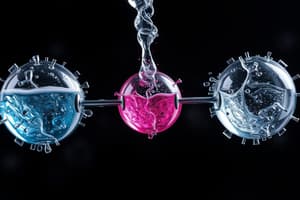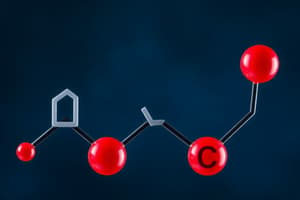Podcast
Questions and Answers
What is produced when trans-cinnamic acid reacts with bromine in acetic acid?
What is produced when trans-cinnamic acid reacts with bromine in acetic acid?
- Brominated cinnamic acid
- Cinnamic acid
- 2,3-dibromo-3-phenylpropanoic acid (correct)
- Brominated propanoic acid
What is the role of sodium bisulphite in the bromination of cinnamic acid?
What is the role of sodium bisulphite in the bromination of cinnamic acid?
- To act as a catalyst
- To neutralize excess bromine (correct)
- To increase the reaction rate
- To precipitate the product
During the bromination reaction, the addition of bromine occurs in what manner?
During the bromination reaction, the addition of bromine occurs in what manner?
- Sequential addition
- Uncontrolled addition
- Syn-addition
- Anti-addition (correct)
Which component is used to dissolve cinnamic acid before the addition of bromine?
Which component is used to dissolve cinnamic acid before the addition of bromine?
What is the purpose of filtering the crude product after the reaction?
What is the purpose of filtering the crude product after the reaction?
What should be done if the orange color of bromine does not disappear after the specified time?
What should be done if the orange color of bromine does not disappear after the specified time?
What safety precautions should be taken while handling bromine?
What safety precautions should be taken while handling bromine?
What type of ion is formed as an intermediate during the reaction mechanism?
What type of ion is formed as an intermediate during the reaction mechanism?
Flashcards
Bromination of cinnamic acid
Bromination of cinnamic acid
A reaction where trans-cinnamic acid reacts with bromine in acetic acid to form 2,3-dibromo-3-phenylpropanoic acid.
Reaction Mechanism
Reaction Mechanism
The reaction involves the formation of a bromonium ion intermediate and its subsequent attack by bromide ion.
Anti-addition
Anti-addition
The bromine atoms are added to opposite sides of the double bond.
Cinnamic acid structure
Cinnamic acid structure
Signup and view all the flashcards
Sodium bisulphite function
Sodium bisulphite function
Signup and view all the flashcards
Product of the reaction
Product of the reaction
Signup and view all the flashcards
Acetic acid role
Acetic acid role
Signup and view all the flashcards
Safety precautions
Safety precautions
Signup and view all the flashcards
Study Notes
Pharmaceutical Organic Chemistry-1 for PharmD-1 Students 2024/2025
- Course covers bromination of cinnamic acid
- The reaction is a specific chemical process involving cinnamic acid and bromine
- Reaction equation given
- Mechanism of the reaction is an "anti addition"
- The specific procedure for the reaction should be undertaken under a fume hood.
- Key steps involve dissolving cinnamic acid in acetic acid, adding bromine/acetic acid solution, repeating addition, leaving the mixture to react and shaking it frequently
- The orange color should be monitored , and if it disappears, more bromine is added.
- 50 ml of water and sodium bisulfite (NaHSO3) are added to remove any excess bromine
- The reaction mixture is filtered, rinsed with cold water, pressed dry and left for air drying
- The yield of the reaction and the melting point of the product are important measurements
- Bromine (Br₂) is highly toxic and corrosive so should be handled in a fume hood
- Wear appropriate protective gear such as lab coat, safety glasses, and gloves
Studying That Suits You
Use AI to generate personalized quizzes and flashcards to suit your learning preferences.
Related Documents
Description
This quiz focuses on the bromination of cinnamic acid, specifically designed for PharmD-1 students. It covers the reaction mechanism of anti addition, safety procedures, and key steps in conducting the reaction. Students will learn about the importance of monitoring color change, measuring yields, and handling toxic chemicals responsibly.




